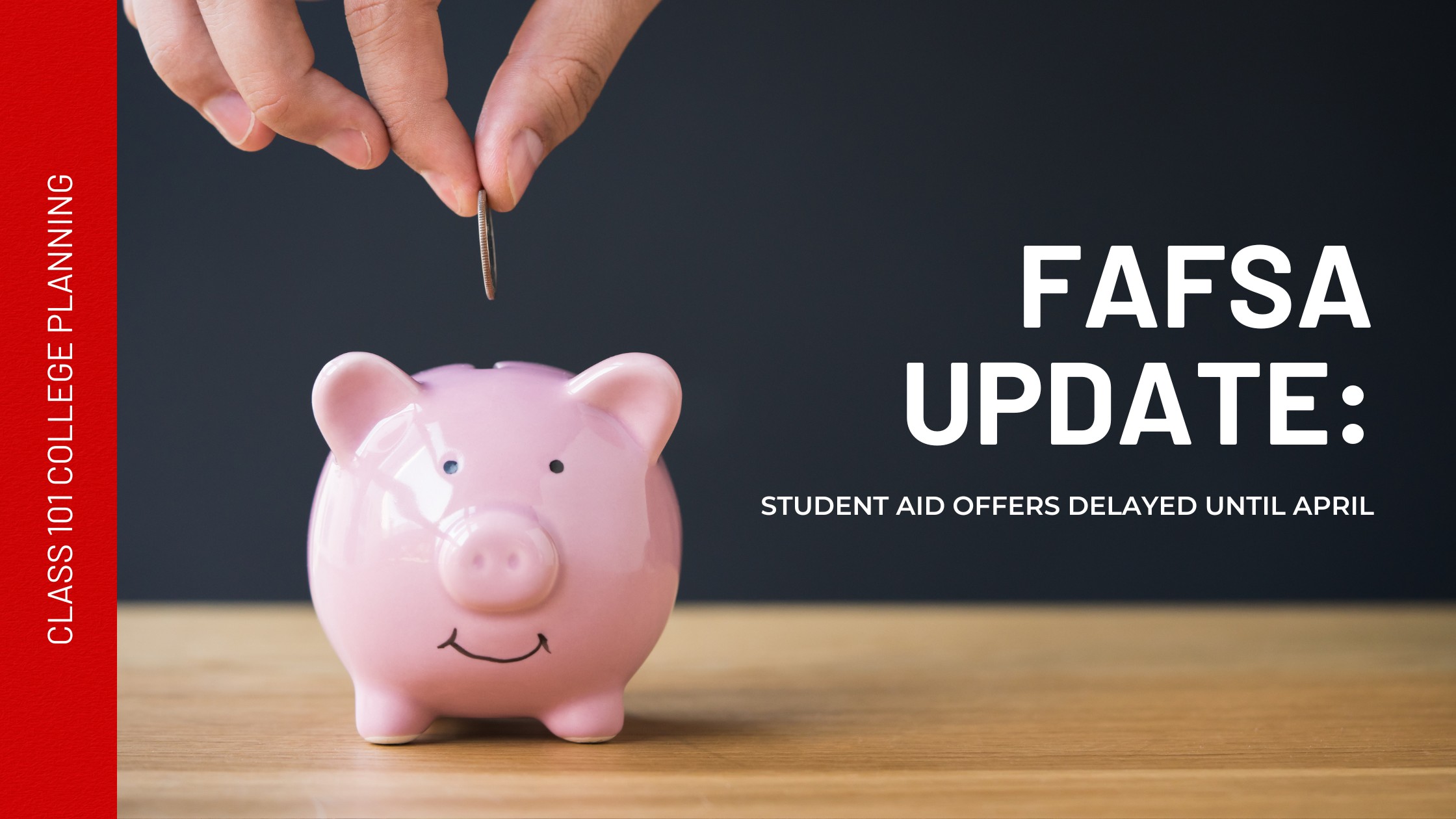February 2, 2024

It’s been a hectic few years for the Department of Education. In 2020, Congress passed legislation requiring major reforms to the FAFSA. Since then, officials had been trying to design a new, streamlined application form for students. Throughout this time, there’s been several delays, affecting when students will be able to hear about financial awards.
It now appears that students will have to wait longer following the new announcement from the Department of Education. This will give students some extra time to fill out the form and have some consequences on when financial aid awards are delivered.
In this blog, we’ll provide you with the basic facts about what is going on to help guide you through this journey!
As you might have heard from our prior blog, the FAFSA (Free Application for Federal Student Aid) is a centralized form that has been around for decades designed to help students easily seek financial aid from the state and federal government. It provides a consistent process to assess eligibility.
The FAFSA is required at all colleges and universities to be considered for any need-based financial aid such as grants, work-study, and student loans. We recommend that families file the FAFSA even if they don’t think they have much chance of qualifying for need based aid. Institutions often require or request the FAFSA for merit awards, and scholarship programs often request it as well. The FAFSA for the 2024-2025 school year will use 2022 tax year information.
The FAFSA is in the midst of a long-overdue update, following a congressional mandate that it simplify its procedures and expand eligibility. While this effort received mostly positive approval when launched, the process itself has proven turbulent. There have already been repeated delays preventing a full launch of the new platform, including a delay in March of last year to update tools, conduct outreach, expand language offerings, and address feedback. In January, the form had what NPR describes as a “shaky” soft launch.
On Tuesday, January 30, the Department of Education announced another delay, this time regarding when financial awards would be delivered. As it noted in its announcement, the Department realized it made an error in the calculations affecting the Student Aid Index, a form that determines “how much federal student aid the student would receive if the student attended the school.”
Officials had forgotten to account for inflation in new calculations from the Index, a mistake that would have cost students $1.8 billion in federal student aid, particularly lower-income students.
To fix this problem, the Department announced it would delay when it would send students’ FAFSA data to schools. This will prevent financial aid offices across the country from creating financial aid offers, as they cannot do so until they receive a completed FAFSA from the Department of Education.
In its announcement, the Department noted that it will now start transmitting FAFSA data to colleges and universities “in the first half of March.” As widely reported, this means that college financial aid offers likely will not be sent until April at the earliest.
Previously, the Department of Education had said it would start ending data in late January to allow colleges to calculate aid.
As of January 30, 2024, the Department of Education had received more than 3.1 million FAFSA forms from students across the country, forms that relied on the incorrect Student Aid Index calculations.
To ensure that all students can access the maximum financial aid they are eligible for, all these students (and those planning to still submit a form) will have their Student Aid Index automatically recalculated.
The Department of Education has not announced when recalculations will be made or when applications will be reprocessed.
The delay is likely to cause stress for student financial aid administrators, who now have an increasingly small window in which to receive FAFSA data and develop financial aid offers. As Justin Draeger, president of the National Association of Student Financial Aid Administrators, noted in a statement, “‘These continued delays, communicated at the last minute, threaten to harm the very students and families that federal student aid is intended to help.”
How this delay affects students depends on how quickly officers are able to process applications and how patient families can be before trying to make a decision about college. As Keith Williams, executive director of Michigan State University, told the New York Times in a statement, “Because of the delay, current and newly-admitted students will not know their estimated financial aid offer until very late in the spring semester.”
We recommend students make sure they check with the college they are applying to, as some universities are considering extending their deposit deadlines or even delaying their decision day in response to recent developments.
The longer wait may give students some extra time when filling out the form. This fact could help with ensuring information is accurate and allow students to reach all the colleges they are interested in. Students can include up to 20 colleges of interest in their applications.
Regardless of what happens, Class 101 remains committed to helping families through this process. Our advisors are aware of the challenges and ready to act to help families make college decisions.
Unfortunately, there’s little families and students can do right now other than wait. We at Class 101 will continue providing updates as we learn more about the situation.
If you need to talk about the FAFSA or these changes in more detail, reach out to one of our Class 101 offices near you to set up an appointment.

June 24, 2025
It’s around this time of year that many students and families start looking for the right college. This process tends to start with a college list, a collection of schools to apply to that match a student’s academic profile, interests, and the kind of experience they want to have. Having a well-rounded, strategic list of […]
Read More >
June 20, 2025
Every year, Class 101 awards scholarships to four high school students through the 101 Scholars program. Given to students of outstanding merit, it asks students to explain how they’ve used their skills and talents to change their community and the lessons they’ve learned from these experiences. This year, Class 101 is pleased to announce the […]
Read More >
May 22, 2025
One of the central parts of the college application process is the application essays. While grades and test scores give some hint at a student’s capabilities, the essay provides an opportunity for a student to present themselves on their terms. It can be used to show not only who they are but how they think […]
Read More >